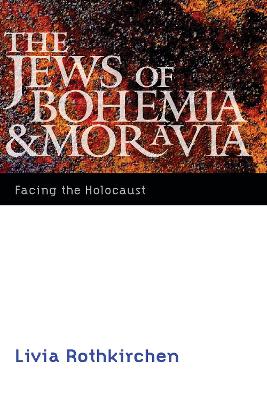Comprehensive History of the Holocaust
1 total work
Published by the University of Nebraska Press, Lincoln, and Yad Vashem, Jerusalem
“We were both small nations whose existence could never be taken for granted,” Václav Havel said of the Czechs and the Jews of Israel in 1990, and indeed, the complex and intimate link between the fortunes of these two peoples is unique in European history. This book by one of the world’s leading authorities on the history of Czech and Slovak Jewry during the Nazi period is the first to thoroughly document this singular relationship and to trace its impact on the fate of the Jews of Bohemia and Moravia during the Holocaust.
Livia Rothkirchen provides a detailed and comprehensive history of how Nazi rule in the Czech lands was shaped as much by local culture and circumstances as by military policy. The extraordinary nature of the Czech Jews’ experience emerges in chapters on the role of the Jewish minority in Czech life; the crises of the Munich agreement and the German occupation; the reaction of the local population to the persecution of the Jews; the policies of the London-based government in exile; the question of Jewish resistance; and the Theresienstadt ghetto. The Jews of Bohemia and Moravia is based on a wealth of primary documents, many uncovered only after the 1989 November revolution, and includes an epilogue on the post-1945 period.
“We were both small nations whose existence could never be taken for granted,” Václav Havel said of the Czechs and the Jews of Israel in 1990, and indeed, the complex and intimate link between the fortunes of these two peoples is unique in European history. This book by one of the world’s leading authorities on the history of Czech and Slovak Jewry during the Nazi period is the first to thoroughly document this singular relationship and to trace its impact on the fate of the Jews of Bohemia and Moravia during the Holocaust.
Livia Rothkirchen provides a detailed and comprehensive history of how Nazi rule in the Czech lands was shaped as much by local culture and circumstances as by military policy. The extraordinary nature of the Czech Jews’ experience emerges in chapters on the role of the Jewish minority in Czech life; the crises of the Munich agreement and the German occupation; the reaction of the local population to the persecution of the Jews; the policies of the London-based government in exile; the question of Jewish resistance; and the Theresienstadt ghetto. The Jews of Bohemia and Moravia is based on a wealth of primary documents, many uncovered only after the 1989 November revolution, and includes an epilogue on the post-1945 period.
